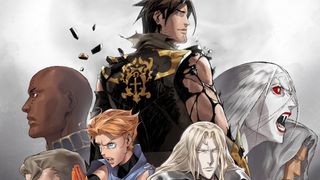Why does Netflix want to get into games now?
Don't expect Netflix to launch an Apple Arcade competitor, but tie-in games for its most popular shows make a lot of sense.

When the story about Netflix "getting into games" dropped last Friday, I tweeted that (a) I had no idea what to think of this, and (b) I didn't want to speculate. In the days since, I've been chatting with friends in high places in the gaming business. There's not much in the way of facts out there even among the gossip-elite, but I now have a working theory that feels pretty sound.

This article originally appeared in Colin Campbell's newsletter How Games Are Changing the World. Colin has written for gaming publications including Edge Magazine, Polygon, and IGN.
Netflix understands that it has reached saturation in terms of subscriptions. And with competition from the likes of Disney and HBO Max, the tried-and-trusted strategy of increasing prices is pretty much played out. Any attempt to try to sell a premium subscription for, say, early content, is likely to be met with howls of protest and / or mass unsubscriptions. Premium content is needed all the time, and at the best quality, just to maintain steady growth.
So the company needs a new kind of content, and it looks like gaming is the best option.
First, let's dispense with the things that Netflix is not thinking about. So far as I know, nobody is suggesting that Netflix is getting into branded hardware or triple-A games, but it's still worth noting why either would be an act of extreme stupidity.
Building a games business is almost impossible. The list of casualties and walking wounded is almost endless but even the richest companies in the world—Amazon, Disney, Google—are groping around in the fog of war. Apple's success is a by-product of iPhone's ubiquity—it's basically a glorified retailer with tenuous monopolistic advantages. Microsoft has spent two stormy, expensive decades establishing a console brand that is still behind Nintendo and Sony, in terms of sales.
Netflix's infrastructure is all about optimizing scale. It's a ubiquitous streaming app that cheaply and efficiently streams linear, non-interactive content to more than 200 million subscribers worldwide.

This might tempt some to think that a games streaming service is in the works. But streaming TV shows, en masse, and streaming live games to individual players, all of whom are acting upon the content, are two different things, and they're never going to converge. One is relatively simple, the other is very hard, and it's expensive. There's hardly any transferable scale or expertise here.
The biggest gaming news, reviews and hardware deals
Keep up to date with the most important stories and the best deals, as picked by the PC Gamer team.
I've seen a few mentions of Apple Arcade as a potential model, but that makes no sense at all. Unlike Apple TV, Netflix has no single platform upon which to anchor interactive content. It doesn't have a controller or a standardized hardware specification.
It's true that the app has been installed on millions of "smart" TV sets these past few years, but take a look at your TV controller. It's barely capable of offering control of even the most basic arcade game. I'm certain that Netflix isn't going to try to sell some tacky controller expecting people to pay a monthly fee for Frogger clones.
Netflix isn't going to try to sell some tacky controller expecting people to pay a monthly fee for Frogger clones
The games that Netflix plans to upsell to its subscribers are going to have to be controllable via any TV remote, which means click-per-minute type experiences, not click-per-second. And, as everyone has mentioned, this suggests narrative adventures like Black Mirror: Bandersnatch and Minecraft: Story Mode.
This is where things get interesting. Netflix has managed to build up a micro-library of interactive curiosities and experiments. Collectively or individually, I doubt that many people would pay extra to play them. But they offer glimpses of possibility that fall into three camps.
First is interactive shows based on the service's biggest hits. I can easily imagine a series of Stranger Things spin-offs that super-fans (of whom there are millions) will happily pay to play. Then there's The Queen's Gambit, Bridgerton, The Umbrella Academy etc.
Second, Netflix has proven itself to be alert to the value of turning gaming brands like Castlevania and Dota into decent TV. Why not go a step further and license other games interactive adventures? We've seen Minecraft, which was highly rated, and a Carmen Sandiego game, but there's also room for any number of brands, from The Witcher to… hell… you name it. Game companies would very much like to open up a new revenue stream for their brands, too, assuming the content is up to scratch.

Third, Netflix has shown itself to be willing to experiment with the form, messing around with interactive nature shows and romances, for example, as well as animation and game-adjacent sci-fi. Weird new entertainment stuff attracts headlines and interest, and I'd love to see new interactive game shows or reality TV formats. Couch-based multiplayer games could be fantastic fun.
The real challenge Netflix has is that choose-your-own-adventures are pretty basic, and (dare I say it) a bit boring. A lot of people admired the pluck of Bandersnatch, but it can be a repetitive experience.
Divergent TV linear is a form that needs a great deal of innovation to become worth playing, and worth paying for. That's why, I think, Netflix is talking to people in gaming. The company is badly in need of new ideas.
I think Netflix understands that any undertaking for interactive content is only ever going to work if the service goes big, from the start, and if it maintains a strong stream of new games. It may well launch with some kind of bundle offering, or a series of bundles, but the goal is almost certainly going to chime with Netflix's subscription model, which means an escalating development schedule and a readiness to accelerate if early signs are positive.
Which brings me back to the earlier point about the sheer difficulty of success in gaming. Netflix certainly sees an opportunity, and it has shown a modicum of creative ability, but the effort, innovation and investment needed for success is daunting. I hope they know what they're doing.

Palworld studio's first move as a publisher is to save a struggling indie dev: 'This is the energy I want to see driving games in 2025'

Yakuza/Like a Dragon creator Toshihiro Nagoshi says his studio's new game won't be that big after all: 'it's not modern to have similar experiences repeated over and over again'
Most Popular





